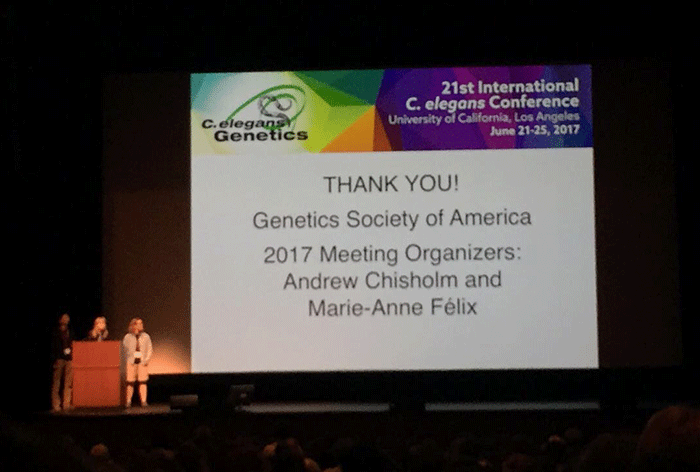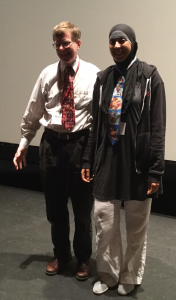We are pleased to announce the GSA Poster Award winners from the 21st International C. elegans Conference! Undergraduate and graduate student members of the GSA were eligible for the awards, and a hard-working team of judges made the determinations.
Congratulations to all!

Poster organizers Jared Young, Tina Gumienny, and Erin Cram present the awards. Source: Bhoomi Madhu, Gumienny lab
Cell Biology
GSA Winner
Vivek Dwivedi, Massachusetts Institute of Technology
“Regulation of Cell Extrusion by Protein Ubiquitination in C. elegans”
Honorable Mention
SoRi Jang, Yale University
“Glycolytic proteins reversibly form punctate structures with liquid-like characteristics in response to hypoxia”
Lauren Penfield, Yale University
“Lamin resists dynein forces to promote recovery from nuclear envelope ruptures in vivo”
Development
GSA Winner
Chelsea Maniscalco, NYU School of Medicine
“Investigating the remodeling of C. elegans primordial germ cells”
Honorable Mention
Xiaobo Wang, University of Montana
“Can DLC-1 binding teach its partner some new tricks?”
Hanna Shin, Texas A&M University
“Identification of a novel Ral signal transduction cascade in C. elegans 2° vulval fate patterning”
Aidan Walker, University of Oxford
“Investigating the role of the ARF GTPase arf-3 in regulating seam cell development and secretion”
Gene Regulation and Genomics
GSA Winner
Chiara Alberti, Research Institute of Molecular Pathology
“A novel small RNA labeling approach uncovers the tissue- and cell-specific microRNomes of C. elegans”
Honorable Mention
Rachel Woodhouse, University of Sydney
“Investigating the role of chromatin modifiers in transgenerational epigenetic inheritance”
Brian Carrick, University of Wisconsin-Madison
“Genomic analyses of interactions that govern an RNA regulatory network in stem cells”
Ecology and Evolution
GSA Winner
Shannon Brady, Northwestern University
“Identification of the gene underlying variation in Caenorhabditis elegans bleomycin sensitivity”
Honorable Mention
Lindsay Johnson, University of Florida
“Network architecture and the cumulative effects of spontaneous mutations on the C. elegans metabolome”
Neurobiology
GSA Winner
Emily Bayer, Columbia University
“Monoamines control the feeding-dependent emergence of sexually dimorphic synaptic connectivity”
Honorable Mention
Deanna DeVore, Rutgers University
“Males need molecular promiscuity for mating: Extracellular matrix genes mec-1, mec-5, and mec-9 are not just for touch neurons”
Devyn Oliver, University of Massachusetts Medical School
“Structural and molecular analysis of a novel model of dendritic spines in C. elegans”
Meghan Arnold and Ryan Guasp, Rutgers University
“Structural Components and Genetic Requirements of Exophers and their Formation”
Munzareen Khan, Brandeis University
“The GCY-29 receptor guanylyl cyclase shapes thermosensory signaling in C. elegans”
Sarah Nordquist, University of Texas at Austin
“Identifying Novel Genes Required for Synaptic Function Among Human 21st Chromosome Orthologs”
Physiology
GSA Winner
Mariangela Sabatella, Erasmus University Medical Center
“Tissue-specific activities of the ERCC-1/XPF-1 endonuclease in response to DNA damage”
Honorable Mention
Bryan Gitschlag, Vanderbilt University
“Selfish mitochondrial genomes exploit nuclear-encoded pathways to propagate”
Cornelia Habacher, Friedrich Miescher Institute for Biomedical Research
“Ribonuclease mediated control of body fat”
Hans Dalton, University of Southern California
“A transient arrest-survival state evolved to enhance fitness during pathogen exposure”
Brett Ipson, University of Texas Health Science Center
“Uncovering the roles of tyrosine aminotransferase and F01D4.5 in the oxidative stress response”
Undergraduate Poster Awards
GSA Winner
Heather Carstensen, California State University
“Characterization of a dauer constitutive mutant with dauer-specific molting defect in Pristionchus pacificus”
Honorable Mention
An-Phong Nguyen and Yesica Mercado Ayon, University of California Riverside
“Dissecting the Role of DRH-3 in RNA Interference in C. elegans”
Delphina Gonzalez, Pomona College
“Complexes regulating C. elegans eggshell formation and egg activation are scaffolded by a common protein”
Dr. Matthew J. Buechner Tie Award for service to the community

Sonia El Mouridi and Matthew J. Beuchner. Source: Tina Gumienny
Sonia El Mouridi, Institut NeuroMyoGène
“Reliable CRISPR/Cas9 genome engineering in Caenorhabditis elegans using a single efficient sgRNA and an easily recognizable phenotype”































